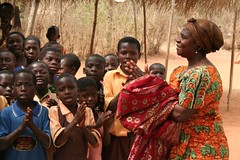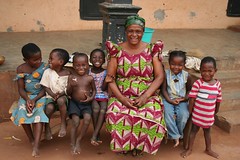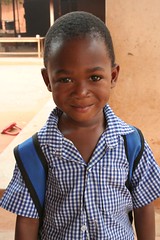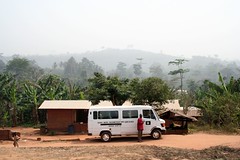by Thomas Palak
When discussing the effects of HIV/AIDS in sub-Saharan Africa, Don Ray becomes somber.
“ It is a very distressing situation,” says Ray, a U of C political science professor with over 30 years of research experience on the continent.
“ Families are torn apart, the economic productivity of a region declines, and orphans are left in the wake of HIV/AIDS. It’s sad to see my second home in such a state.”
With 29 million inhabitants of sub-Saharan Africa currently infected with the virus, there is a dire need for action.
Ray believes that one of the best ways to see results in the battle against AIDS lies in the role tribal chiefs must play in any grassroots anti-HIV/AIDS campaign.
His award of a $450,000 grant from the International Development Research Centre of Canada (IDRC) will help him to further investigate the function of tribal chiefs in community development projects within this region of Africa.
Research teams are currently in place in Botswana, South Africa, and Ghana to facilitate a cross-country comparison. “Grassroots Governance,” edited by Ray, is the first book in a series culminating this research.

According to Ray, there are three main findings of interest.
First, it is clear that chiefs are deeply involved in community development.
Second, chiefs have widened their focus from economic development to address health issues as well.
Thirdly, it is crucial to note that traditional chieftain systems, generally thought of as male-dominated, also include a contingent of women.
To prove his third point, he cites his involvement with the Manya Krobo Queen Mothers of southern Ghana, a group second-in-command in the traditional political order of their community.
“ These women have a special credibility and legitimacy because of their historical roots,” Ray says. “When they speak, people listen.”
Ray’s research findings have shown that the Queen Mothers are instrumental in the battle to combat HIV/AIDS, undertaking education campaigns, administering AIDS tests and caring for over 600 AIDS orphans.
Ray believes many politicians and international development workers tend to overlook traditional leaders such as the Queen Mothers because of their perceived lack of inclination towards change.
“ It is true that traditional leaders represent something treasured from the past such as a community’s culture and religion, but they are also tremendous catalysts to social change,” Ray says.

As an example, Ray points to the important role chiefs played in promoting development in general.
“My experiences with chiefs in Ghana indicated that grassroots movements initiated by chiefs had amazing effects.They were instrumental in empowering development at the grassroots level,” says Ray.
“ It seemed plausible to me that they could do the same in the struggle to eradicate HIV/AIDS.”
So far, Ray’s research indicates that this is in fact the case.
In Ghana, where chiefs and traditional leader groups such as the Queen Mothers are actively involved in the HIV/AIDS fight, infection rates are low (five per cent in the 15-49 age category).
In South Africa, where there is minimal chief involvement, the rate is closer to 25 per cent.
“ Our research shows that involving chiefs is a powerful tool in the fight against HIV/AIDS,” Ray says. “The successful model in Ghana could be applied to other sub-Saharan African countries and alleviate some of the suffering of a continent near and dear to my heart.”

Calgary woman honoured as African Queen mother
While teenagers in Canada struggle with math and science and how to be accepted by their peers, some 10 million young Africans, aged 15-24, are battling HIV/AIDS. The orphan population is skyrocketing. Almost 13 million children have lost one or both parents to AIDS in Sub-Saharan Africa.
Though the death toll continues to decimate populations across Africa, some Ghanaian female chiefs—the Manya Krobo Queen Mothers—are responding to the crises in their community with success. Through education and other grassroots actions, in one regional town the prevalence rate of HIV has dropped since 1998. University of Calgary student Kim Schoon knows first-hand how individual efforts can make a difference. While visiting Ghana recently, the Queen Mothers named Schoon honourary chief for her local and international commitment in fighting AIDS alongside other university students in the Global AIDS Awareness Group (GAAG).
“ It was the biggest honour of my life,” says Schoon. “There were about 50 Queen Mothers in the room wearing blue-and-white outfits, signifying the notion of coming out of the darkness of HIV/AIDS and into the light of compassion and acceptance.”
U of C Political Science Professor Don Ray is researching the positive impact that chiefs in Africa can have in the struggle against AIDS.
“The Queen Mothers have historically been responsible for the care of orphans. They knew something was wrong when the number of orphans in their community began to increase alarmingly,” says Ray. “What these female chiefs have accomplished has been astonishing.”
During AIDS Week on November 28, from 12 pm to 2 p.m. at the University of Calgary in Trailer A, Schoon will be talking about her experiences in Ghana: about the efforts of the Queen Mothers to address AIDS in their communities, and about what the average Calgarian can do both locally and globally to fight AIDS.
At the panel discussion she will talk about the Queen Mothers’ “Smart Ladies” project which teaches sewing skills to young girls, offering them money making alternatives to the often inevitable sex trade. She will also talk about what GAAG is doing to support the Queen Mothers work in Ghana.
“ I want people to know, any one of us can make a difference,” she says.



